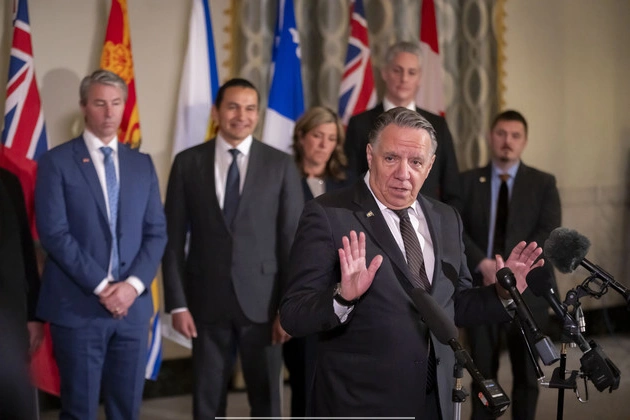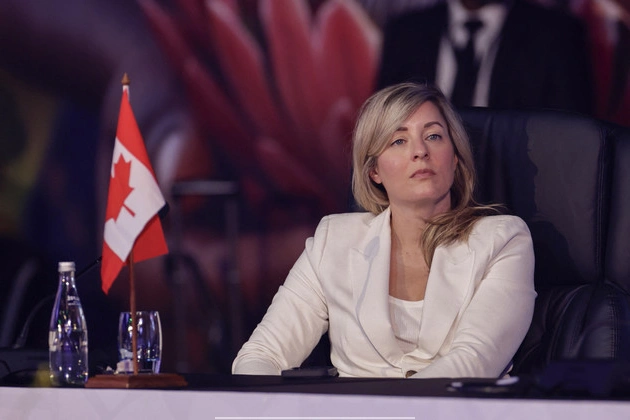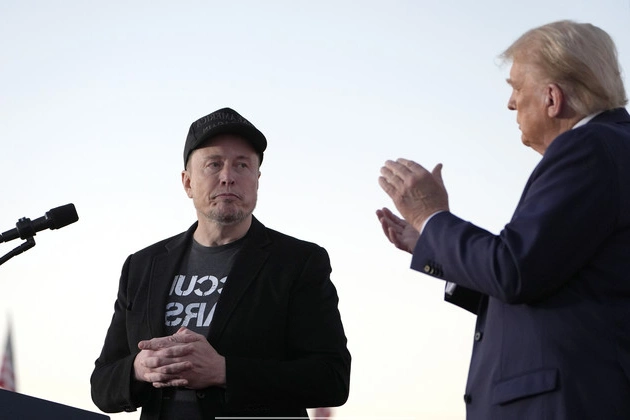
Quebec Premier François Legault, a former airline CEO, recalls a memorable exchange with Donald Trump, back when the U.S. president was launching a Trump Shuttle between Boston and New York and wanted to acquire the call letters “AT” from Air Transat.
Legault, then Air Transat’s CEO, says he had a gruff response: “No way.”
During a visit to Washington, the leader of Canada’s second-most populous province said when he recently reminded the U.S. president of their exchange, Trump replied: “You’re my kind of guy.”
Now, with Canada and the U.S. embroiled in an unprecedented crisis created by Trump, Legault hopes can indeed be the president’s “kind of guy” and resolve an increasingly ugly dispute between two countries that have long been the closest of friends.
Seeking a Win-Win Deal
“I’m a businessman. He’s a businessman,” Legault told POLITICO. “I would like to have a longer chat with him and try to discuss a win-win deal.”
Legault was one of a parade of Canadian provincial leaders in Washington this week, meeting with lawmakers, business leaders, senior advisers at the White House — making the case against tariffs.
Canada has tried various appeals to Trump: from an initially conciliatory “we can take a joke” response to taunts about becoming the 51st state, to a pragmatic offer of a $1.3 billion border security plan, to increasingly tough talk about retaliation and sovereignty. So far, Ottawa has only secured a monthlong pause on across-the-board 25 percent tariffs, with no exemption for the steel and aluminum tariffs announced this week.
The new tariffs are a particular problem for Quebec, which provides 60 percent of America’s aluminum. So Legault has jumped into action on the theory that what one flamboyant capitalist needs is another flamboyant capitalist to deal with.
Economic Impact and Negotiations
Legault insists there is a “win-win” deal to be had with Trump, who negotiated the original deal to replace NAFTA.
Legault would like to change the conversation away from the $63.3 billion U.S. trade deficit with Canada, which is driven primarily by U.S. refineries buying discounted, landlocked Canadian oil.
He’d like to focus on building out manufacturing, particularly in the aerospace sector. “We have 40,000 people working in the aerospace business in Montreal. We are the third-largest [aerospace hub] in the world, after Seattle and Toulouse. I would like to maybe make a deal in the aerospace business to grow what is around Boeing. Maybe also increase what he wants to do with defense,” he said.
Legault dismisses dairy as small compared to manufacturing. “Honestly, we are not talking about big money. We already agreed [in the USMCA] that the U.S. can take a part of the milk market in Canada. So we already made this compromise.”
The deal he envisions would focus on manufacturing, lumber, aerospace — and critical minerals.
Strategic Minerals and Trade Relations
“We have all the minerals: lithium, nickel, graphite, rare earths, copper, zinc, titanium. I think it would be wise for the United States to make a deal with us. Some of these minerals are imported from China. I think the United States and North America should be independent from China. So we can work on strategic minerals together,” he said.
In Legault’s telling, Trump’s aluminum tariffs will result in higher production costs for U.S. industries like autos and aerospace.
Whether or not he can capture Trump’s attention, Ottawa and provincial governments are working on ways to support the Canadian economy during the tariff wars, including increasing preferences for Canadian companies in government procurement and supporting efforts to diversify exports away from the U.S.
Public Opinion and Future Prospects
The threat has so inflamed Canadian public opinion that long-controversial proposals are receiving a second look from policymakers: from efforts to tear down trade barriers between provinces to the possibility of building new fossil fuel infrastructure aimed at exporting beyond North America.
Legault didn’t rule out the possibility that his eco-conscious province could change its long-held opposition to allowing pipelines that could take western Canadian oil to tidewater and enable exports to Europe.
As for how Trump’s 51st state comments play in his province, ever sensitive about its sovereignty, he said: “In Quebec, no way!”
“Never will Quebeckers, speaking French, accept becoming the 51st state of the United States.”
He added: “Of course, we have a lot of resources — we have water, we have critical minerals. Maybe he can dream of having all that for free, but it won’t happen.”















